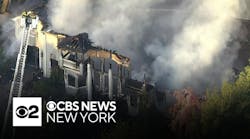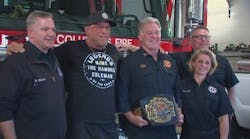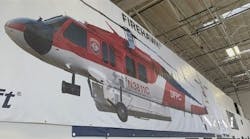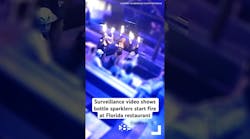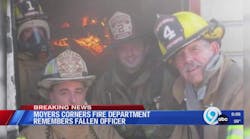A shrill tone slices through the stillness of a double-wide trailer in Geraldine. It's 2 a.m., and this alarm clock doesn't have a snooze button.
"DeKalb 911 to all Geraldine Fire: All Geraldine Fire, we have reports of a structure fire on County Road 9 ..."
Before the scratchy voice of the dispatcher can finish her sentence, 36-year-old Brent Abernathy is up and fumbling for his boots. In less than two minutes he dresses, grabs the screaming hand-held radio from the bedside table and heads for his pick-up truck.
He pushes himself through the living room, his left leg almost always two steps ahead of his right. His right foot points toward his left and drags across the floor, nearly tripping him more than once. But he doesn't notice. His journey takes him around the 42-inch television, through the dining room and into the kitchen. He reaches the side door and looks over the kitchen bar and into the living room.
"Are you coming?," he yells to the empty room. His twin brother, Kent, shuffles into view, fully dressed and with his own black hand-held clipped to his side.
"Yeah, just hold your horses," he calls back.
Kent pushes toward the door in much the same way as his brother, with one hand gliding across the wall for support. He makes his way from the far end of the living room, around an extra wall that juts out beside his bedroom door and then around a coffee table. Finally, he too reaches the side door.
As they pull themselves up into Brent's pewter Chevrolet Z-71, Kent presses the mic on the truck radio. Slightly out of breath, he informs the dispatcher, "Geraldine 9 and 19 en route."
This has been the Abernathy brothers' unscheduled, middle-of-the-night routine since they were 18 years old.
"Whether we've just went to bed or whether we've been in bed all night or whatever, we get up and go," Kent said. "That's just part of it."
But planning out how you're going to pull yourself up into a fire engine without help from your lower body isn't "just part" of being a volunteer firefighter.
What sets the Abernathys apart from their comrades is not just their mirrored faces, but the fact they aren't able to run into a burning building. Both twins are spastic paraplegics.
The Obstacle
Spastic paraplegia is a rare form of muscular dystrophy that affects some 20,000 Americans, according to the Spastic Paraplegia Foundation. It can strike an individual at any time during his or her life and pays no mind to race or gender. The disease progressively weakens the leg and hip muscles, making it difficult or, in some cases, impossible to walk or stand.
The disease took hold of Brent and Kent's legs when they were in the sixth grade.
"The doctor told us this is something you can't predict," said the twins' father, Terry Abernathy. "He said it could have its course run and not really affect them anymore, or it could in six weeks' time have them where they can't even walk."
The doctors at Children's Hospital in Birmingham explained to Terry and his wife, Sue, that any treatment would have to wait until the boys' legs stopped growing. During the summer before their senior year of high school, the twins underwent surgery to lengthen their heel cords, also known as the Achilles tendon.
Surgeons made angled cuts into the cords, then reconnected them to make them longer. Spastic paraplegia is a neurological disorder. The nerves hold the leg muscles tense, preventing the individual from walking normally. Lengthening the tendons allowed the muscles to relax slightly and put the twins back flat on their feet. That surgery is the only form of treatment Brent and Kent ever received. Terry said the doctors informed them that lengthening the heel cords was really all they could do.
The years between then and now have seen the return of the slow-progressing deterioration of the twins' legs. They cannot stand without something sturdy to lean on and often fall while walking across the room. Although their steps are shaky, their determination to get where they're going never wavers.
"Even though we might not can do it, we want to try anyway," Kent said. "We might not can do it, and we might can do it."
Firefighting is one of those things they were determined to try. Brent said he and his brother get their love of the job from their dad. Terry has been a member of the Tenbroeck Volunteer Fire Department for most of his sons' lives. Brent and Kent grew up washing, waxing and working on fire trucks. When they were 16, Terry decided they were old enough to go on their first call. By the time they graduated high school, both had become members of their dad's department.
Standing Outside the Fire
Sometimes determination and stubbornness go hand-in-hand. Terry said his sons are a classic example of that. They are so determined to prove they can do anything anyone else can that sometimes they try to ignore their bodies' limitations. Their disability restricts what they can do at a fire scene, an understandable frustration.
"I like to have never got across to them that they are worth just as much out there running the pump as they would be handling a hose," Terry said. "They stayed mad at me a right smart over that."
The house is half-swallowed by orange flames and dark gray smoke when members of the Geraldine Volunteer Fire Department arrive on the scene. Firefighters, adorned head to toe in beige, fire-resistant turnout gear, jump from the cabs of two red engines. They immediately begin to yank 400 feet of 1 1/2-inch fire hose off the truck bed and toward the burning house.
While their buddies are grabbing nozzles, shouldering axes and dragging hoses, Brent and Kent slide out of their pickup and head toward separate fire engines. Kent places a steadying hand against the cold diamond plate of Engine Three. In front of him is a confusing arrangement of knobs, dials and pulls. Each one is labeled with its function, but Kent doesn't have time to read them closely. His buddies need water.
Almost without having to think about it, he pulls three of the silver handles in perfectly ordered succession. There is a muffled whoosh as hundreds of gallons of water are pushed through the two connected hoses. A hissing from the nozzle tells Kent he's done his job.
Brian West usually is one of the guys waiting at the other end of the fire hose. He has worked with the Abernathy brothers in the Geraldine Fire Department for the past three years. West said he can't put into words what kind of benefit Brent and Kent are at a fire scene.
Terry said after a while, the twins realized every job in firefighting is important. A fire hose is no use without water, and water isn't going to get there without someone at the truck, manning the pump.
Realizing their limits, however, doesn't keep Brent and Kent from testing them. In March 2006, the brothers obtained their Volunteer Firefighter Certification from the Alabama Fire College. To get this certificate, Brent and Kent had to pass a course known as the "Firefighter 160." The course demands skills in both the classroom and in practical exercises.
The 160
"Holy freakin' terror" is how West described the physical challenges of the 160 course. The drills include everything from searching for a hidden dummy in a burning building to crawling blindfolded through a winding, hazardous maze. Brent said he and Kent completed every task except the ladder climb, the obstacle course and the maze.
"Other people think we can't do it because we've got this disability, but if I want to try something, I'll try it," Kent says. "I might not succeed at it, but I'll give it a try."
The instructors at the Fort Payne training center, where the brothers took the course, were more than willing to let the Abernathys try. "They said, 'Y'all are an inspiration to us,' " Brent remembered. He said the instructors told them to try whatever exercises they felt they would be able to do. Neither one had to be told twice.
One drill they completed takes place in what's called "the burn building." A gray, two-story building that looks more like a giant piece of playground equipment is filled with smoke and heat. A 180-pound dummy is hidden somewhere inside. The task is search and rescue.
Two firefighters at a time go in. Each wears an extra 70 pounds of gear. They are dressed in full turnouts, including fire-resistant pants and jacket, boots, gloves, a Nomex hood (similar to a ski mask, but with an opening for the entire face), a helmet and a Self-Contained Breathing Apparatus. They enter on their hands and knees, one directly behind the other.
The sunshine from outside disappears. It's like crawling into a hot, black storm cloud. There are no flames, but the temperature reaches 175 degrees. The sweat seals their breathing masks to their faces. This is as close as it gets to the real thing.
The interior is a replica of a typical single-family home. Downstairs, a couch and television sit in the living room and a stove and refrigerator complete the kitchen. Upstairs holds a bedroom and non-working bathroom. But you can't see any of this through the thick darkness. You have to feel it.
A right-hand sweep is used to search the bottom floor. In this technique, the firefighter in front keeps his or her left hand on the wall and uses the other to feel through the house. The firefighter in the back keeps a hold on the front's right ankle. The second firefighter stretches his or her right hand out into the smoke as far as it will reach, searching for a victim. Typically, the search carries the firefighters throughout both floors, but for the Abernathys, it was confined to the ground floor. Once the dummy is found, the firefighters make their way back toward daylight by reversing their sweeping method, this time with the dummy in tow.
Although this drill is probably the closest Brent or Kent will come to participating in an actual search and rescue of a burning house, fellow firefighter Wendel Evans said he's glad they chose to get the experience.
"Seeing them do what they do gives me more motivation," Evans said. "Most people in their situation would just sit on their butts and not even try to do anything."
But the Abernathys always will try.
In It Together
Most everything Brent and Kent do, they do together. They were born together; they live together; they fight fires and disease together.
"Two is always better than one," Kent says.
Their mother, Sue, said her boys have always been close. She recalled when they both had surgery on their legs. Brent went under the knife first and emerged with both legs stuck straight out from his wheelchair. One week later, it was Kent's turn. "Brent cried because he couldn't go," Sue said. "Kent went when (Brent) had his surgery and (Brent) wanted to be there when Kent did."
To mess with one twin is to mess with the other. Kent said if anybody picks on one of them, the other is right there, ready to jump in the fight. "The other one would flog 'em just like an ole hen," Sue said with a laugh.
That isn't to say Brent and Kent don't have their differences. They argue just like anyone else.
"We just get in the floor and wrestle every now and then, and that's it," Brent said.
Although they like most of the same things and spend a large chunk of time together serving their community, the average day doesn't find them in the same place.
"We get up; he goes one way, and I go the other," Brent says.
Their disability keeps them from working regular jobs, but both twins do their best to keep busy.
"They'd do anything to help anybody," West says.
Ask Brent and Kent why they get up in the middle of the night. Ask them why they stumble, trip and fall hurrying to help a stranger, when they could easily remain in the safety of their beds. Ask them, and you won't really get an answer. All they know is firefighting is something they've always wanted to do. It's just always been there. As children, they watched their dad get up and do what many are afraid to do. As men, they aren't going to let anything, even weak legs, stop them from following in his footsteps.
Republished with permission of The Gadsden Times.
